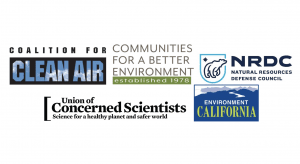To:
The Honorable Toni Atkins
Senate President Pro Tempore
The Honorable Anthony Rendon
Speaker of the Assembly
The Honorable Nancy Skinner
Senate Budget Committee Chair
The Honorable Phil Ting
Assembly Budget Committee Chair
Re: Proposed 2021-22 Budget for Cleaning up Our Air
Dear Pro Tempore Atkins, Speaker Rendon, Chair Skinner and Chair Ting:
Most of our state fails to meet national ambient air quality standards set to protect public health. That means nearly all Californians encounter unhealthful air quality days. That results in lost days at school, emergency room visits and hospitalizations, and lost days at work, not to mention human suffering.
Fortunately, the state has consistently taken action to reduce emissions and is a world leader for its vehicle emissions reduction regulations. The state has also learned, through years of experience and through observation of policies in other countries, that a consistent flow of incentives is important to ensure and accelerate consumer demand for clean vehicles and to advance clean technology. These incentives include vehicle purchase vouchers, reliable and available vehicle fueling infrastructure, and pilot and demonstration projects for advanced technologies. The state has also launched innovative equity projects to bring clean mobility to our disadvantaged communities, including scrap-and-replace incentives, EV car-sharing, and rural school buses. But most of our incentive projects have exhausted their funds or soon will, and they urgently need replenishment.
Therefore, we recommend that the Legislature:
- Approve the Governor’s request for $315 million for Clean Trucks, Buses and Off- Road Equipment. Fine particulate matter produced by diesel trucks is particularly health-threatening. It is responsible for about 95 percent of pollution-related health impacts in the world. In California, communities of color are most burdened by this diesel truck pollution.
- Approve the Governor’s request for $150 million for Clean Cars 4 All and other Transportation Equity Projects. These investments expand the benefits of clean mobility to all Californians, including disadvantaged and low-income communities, by increasing transportation equity investments — including EV purchase incentives for low and moderate income buyers, scrap-and-replace subsidies, van-pooling, and community- driven clean mobility projects. We recommend that at least $75 million of this total be allocated to Clean Cars 4 All, which funds clean replacement vehicles for low-and moderate-income drivers scrapping gross-polluting cars, and at least $25 million for EV purchase incentives for low-and-moderate-income drivers.
- Reauthorize the Clean Transportation Program and Air Quality Improvement Program (AB 118/AB 8), which provides incentives to support innovation and accelerate the development and deployment of advanced transportation technologies and fueling infrastructure. This Energy Commission and Air Resources Board program invests about $125 million a year, leveraging public and private investments, and will sunset on January 1, 2024. We support the securitization of $1 billion of these future revenues to support the expansion of the CEC’s Clean Transportation Program. Continued public support for charger deployment is essential to meeting the state’s ZEV, air quality and climate needs. A recent CEC staff report finds that the state will need over 1.5 million public and shared private chargers for light-duty vehicles and 157,000 fast chargers for medium and heavy-duty vehicles in 2030. The report finds that charging infrastructure deployment is lagging vehicle sales, and this gap may stymie progress toward zero-emission targets. We believe that this budget action should be followed by a policy bill that ensures that the infrastructure serves disadvantaged communities and meets the needs of buses and trucks.
- Support the Governor’s proposal of $325 million for Community Air Protection (AB 617), which focuses on reducing the cumulative impacts of air pollution in disadvantaged communities that have been hit hard by unhealthy air, climate change, the pandemic and recession.
- Take early action on 2020-2021 Greenhouse Gas Reduction Fund allocations. Programs that provide clean, dependable transportation to low-income Californians will run out of funds before the next fiscal year begins, so the Legislature should take action on the current year GGRF to provide relief as soon as possible to the most vulnerable communities.
- Prioritize Heavy-Duty and Equity Projects should additional revenue become available. In past years, GGRF dollars have ultimately exceeded projections in the January budget. If this is the case again this year, we urge you to invest additional funds in the heavy-duty and equity projects that benefit our disadvantaged and low-income communities. These programs are perpetually over-subscribed, and the amounts in the Governor’s budget do not come close to meeting the need. Following a devastating 2020, the budget can send a strong signal that these investments provide even greater benefits in areas most harmed by the COVID-19 pandemic, disadvantaged and low-income communities, communities of color, the underemployed or unemployed, and to those Californians struggling with re-entry following incarceration.
California has led the nation in clean energy and clean transportation policies and incentives, thereby substantially reducing air pollution and protecting public health while spurring new companies and a rebirth of auto manufacturing in the state. Today, the clean vehicle industry employs over 275,000 Californians in EV-related jobs (according to a report by the Los Angeles Economic Development Corporation) and has spurred billions of dollars in private sector investment. We lead the nation in designing and manufacturing zero-emission vehicles and infrastructure, and our fleets are trailblazers, using their purchasing power to purchase zero- emission vehicle technologies. Additional public investment is essential to support the quality, living wage jobs created to date, grow jobs and economic benefits equitably in the future, accelerate market adoption, build out supporting infrastructure, and leverage additional private capital investment.
Thank you for considering our views.
Respectfully,
Bill Magavern
Policy Director
Coalition for Clean Air
Laura Deehan
State Director
Environment California
Bahram Fazeli
Director of Research & Policy
Communities for a Better Environment
Jason Barbose
Senior Policy Manager
Western States Union of Concerned Scientists
Simon Mui
Deputy Director
Clean Vehicles & Fuels Group
Natural Resources Defense Council








